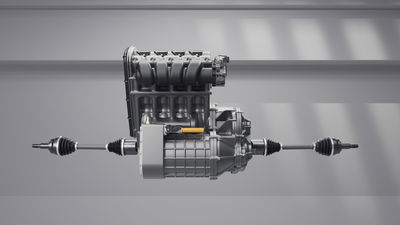Does Having An Automatic Gearbox Always Suck?

Once upon a time, automatic gearboxes weren’t really that good. The term ‘slush box’ was often applied to them, and for good reason: a gear change in an auto was almost always a little on the lethargic side. That’s why when we see something like a Mk4 Toyota Supra in the classifieds with a drive selector poking out between the front seats rather than a stick shift, we tend to despair.
That’s not the case anymore, though. At the top end of the scale, there are the dual-clutch units, so called because you have one clutch for the odd gears and another for the even-numbered cogs, allowing for blink-and-you’ll-miss-it shifts. Hooked up to a brilliant engine, they can be sublime; that’s certainly the case with the seven-speed transaxle unit in the Mercedes AMG GT we briefly drove last week.

Even conventional single-clutch units are getting very, very good. ZF’s slick eight-speed transmission is scarcely slower than DCTs in some cars, and is jolly impressive in the new Jaguar XE. Plus, on most autos these days - regardless of the amount of clutches they’re packing - you’ll usually get paddle shifters to allow you to take control of gear changes. In fact, even some modern CVT gearboxes have manual override options.
Automatic gearboxes are so good these days, there are instances where I don’t actually mind having one over a manual, even if the latter will always give a little more involvement in the driving experience. A supercar? DCT’s just fine by me; these things are all about raw pace, something my left leg and left arm will just muck up. A wafty high-powered GT car, or a big luxury V8 saloon? I’ll happily take a crisp auto, as such a transmission nicely fits the relaxed driving you’ll be doing for much of the time, while delivering the goods when you want to give it what-for.
Hell, I’d even consider something like a Boxster with a PDK gearbox, although the manual’s excessively long first and second gears might have something to do with that. But, there’s one kind of car I’m just not so sure could ever work with automatic gearboxes: hot hatchbacks.

Apart from the razor sharp end of hot hatchery - motors like the Seat Leon Cupra 280 and Renault Megane 275 are serious performance machines - these cars should always be about big driving fun for not much money and extracting every last bit of performance, because you can do so without worrying about serious jail time. A manual gearbox feels vital for that fun factor, especially when modern hot hatches tend to be packing four-pot engines that lack aural drama.

I always try to keep an open mind, so when speccing out our incoming Skoda Octavia vRS (very much a hot hatchback, despite that saloon-look body) long-term test car earlier this year, I acted against every single instinct that wanted to pick the six-speed manual, and asked instead for the six-speed DSG dual-clutch automatic.
At this point, I’d love to say that it’s changed my mind. I’d love to say that it’s convinced me that a hot hatch with a modest 217bhp is enhanced by a good auto ‘box. But the fact is, it hasn’t. The transmission itself is very good. I have some misgivings about it being a little slow to react when quickly pulling out of junctions when you’re not in Sport mode, but you certainly can’t grumble at the speed of the super-fast shifts. When driving hard, it always feels like something’s missing in the mix. I didn’t feel this way when I drove an Octavia vRS the first time around, and I believe that’s because it was packing a manual.

It’s a similar story with the automatic Mini JCW we tested a few weeks ago. We took one home after the launch to get a little time behind the wheel, but it only ever felt 90 per cent there as a driver’s car. We’re yet to try a manual, but I’ve no doubt that the extra 10 per cent that seems to be missing will be plugged by the inclusion of a stick shifter.
So, while I think that there is a time and a place for automatics - even if you’re a petrolhead - I draw the line at hot hatches. Some cars are just better with a little more human intervention.














Comments
No comments found.